If I could name one thing which has been the most transformative for our community over the last couple of decades, it would have to be the proliferation of hackerspaces. Ostensibly a place which provides access to tools and machinery, these organisations have become so much more. They bring together like-minded people, and from such a meeting of minds have come a plethora of high quality projects, events, and other good things.
Just What Is A Hackerspace?
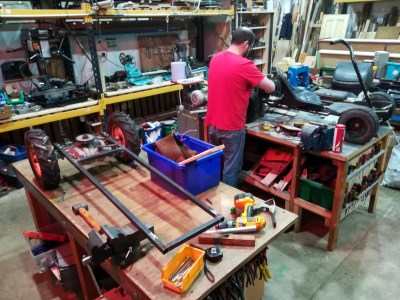
Hackerspaces loosely come in many forms, from co-working spaces or libraries who have invested in a 3D printer and imagine themselves to be a hackerspace, through to anarchist collectives in abandoned warehouses who support their city’s alternative communities with technology. For me, hackerspaces must be community organisations rather than for-profit ones, so for the purposes of this article I’m not referring to closely-allied commercial spaces such as FabLabs.
So a good hackerspace for me is a group of tech enthusiasts who’ve come together, probably formed a non-profit association, and rented a dilapidated basement or industrial unit somewhere. The tools and machines inside aren’t shiny and new but they mostly work, and round that fridge stocked with Club-Mate you’ll find a community of friends, people who don’t think it’s odd to always want to know how things work. In a good hackerspace you’ll have found your place, and you can be much more than you would have been alone.
I visit plenty of hackerspaces across Europe as I wander the continent on an Interrail pass. I’m a member of three of them at the moment, though my main home in the UK is at Milton Keynes Makerspace. I’ve sat on recycled sofas drinking caffeinated beverages in more cities than I can count, and along the way I’ve seen close-up the many different ways a hackerspace can be run. I’ve seen spaces falling apart at the seams, I’ve seen ones a little too regimented for my taste, and others with too much of an emphasis on radical ideology, but mostly I’ve seen spaces that get it about right and I feel at home in. So perhaps it’s time to sit down and talk about what I think makes a good hackerspace. What is my space?
It’s More Than Just The Space
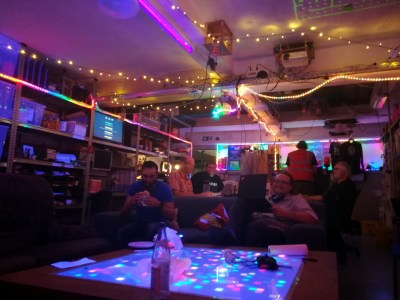
Unsurprisingly, the space itself is secondary to how good a hackerspace is, though there are some that are lucky enough to have amazing premises. In Milton Keynes we share for the moment a large industrial unit with an organisation which provides a social and workshop space for old guys, and while that means we have a huge workshop, it’s not that which makes the space a good one to be a member of, instead that’s the community. But even the community is a fragile entity in a hackerspace, as what works for one section may not work for another. At this point what makes a really good hackerspace differentiates itself from the rest, and it’s worth going into why.
The flavour of a hackerspace starts from its very beginning when a group of geeks have that first meeting in a pub somewhere, though at that point they probably don’t realise it. They face a choice as to how the space is run, whether for example it follows the consensus model, the laid-back board model, or a more direct management model. Quite a few of the first wave of European hackerspaces followed the consensus model, while more recent ones have taken a board-based approach in which the general membership get their say in choosing the board but not in how the space is run. In my experience of being a member of a consensus-based space the drama level was simply too high for my tastes, and I think that had a detrimental effect on both the community and the continuity of the space. By comparison the board-based spaces seem to be much more stable, and being a member is more enjoyable.
It’s possible then for a group of people to start a hackerspace with good governance and an active community. But they’re not finished yet, and in describing why I think that I may be about to descend into a zone which will be controversial for some. Perhaps I should start with a remark I made a few months ago to a friend in the hackerspace community; that I knew of at least four women who had been put off by their space. To be clear, the space in question is great, it’s a favourite of mine that has done all the right things to make a sustainable community that’s a joy to spend time in. It’s not even fair to point the finger at this space alone, I’m certain I could find many other great spaces with exactly the same issue. Putting it simply, the hackerspace community so often isn’t providing the environment needed to attract the people it should, and if my saying that offends you then It’s a fair guess you don’t manage your hackerspace’s membership. No space can afford to turn away members, yet that’s what many are doing. It’s the how and the why that we should be doing better as a community.
Sometimes We Don’t See Ourselves As Others Do
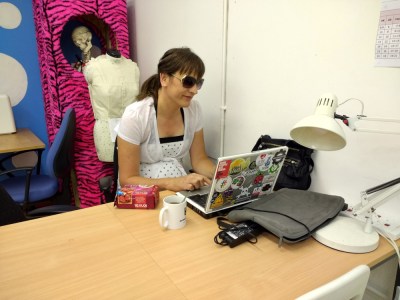
The question of broadening the appeal of a hackerspace has been a concern of mine ever since I walked into my first hackerspace over a decade ago. Hackerspaces can be intimidating places if you’re not one of the in crowd, and it only takes one thing to turn someone away for good. It’s easy to unwittingly form an impenetrable clique, or to have members place themselves as barriers to entry without realising it, by gatekeeping access to tools or equipment. Add to that another of the things which bind us, that many of us including me are not neurotypical, and even a well-run hackerspace can feel insensitive, alien, and downright hostile. We can definitely do better than this, and if we do so then our spaces can only become stronger.
How to tackle this probably depends to a great extent on circumstances. In some cases the equipment on offer can affect the type of people attracted. As an example BioCurious Labs, a makerspace for biotech in Silicon Valley, attracts a different crowd – more artists, scientists, and other bright, curious people from a wider array of backgrounds than the more usual technology-focused hackerspace. The best approach to this problem I’ve seen for myself came from an unexpected angle, in starting a textile operation. This wasn’t through some old-fashioned notion that women sew, but to attract members who would normally never consider a hackerspace, namely those mostly older women who do knit or sew. The aim of their presence was to subtly change the atmosphere to the extent that prospective members such as those women who found themselves put off would find it more welcoming. My first hackerspace in Oxford did this with some success, and I am very pleased to have seen it spontaneously happening in MK, too.
So given the above, what is my space? It’s one where the running of the space doesn’t get in the way of being a member, and the atmosphere doesn’t put me off being a member in the first place. My space where I’m from in the UK is Milton Keynes Makerspace, and when I’m not on my travels around Europe, it’s home. I’ll put the kettle on.

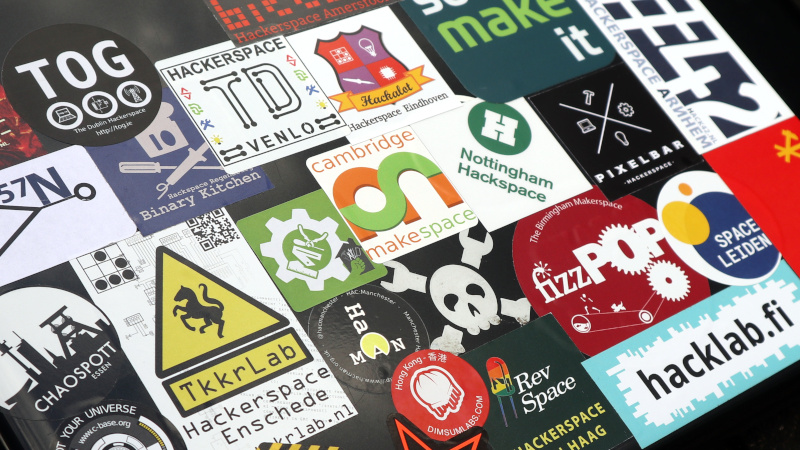









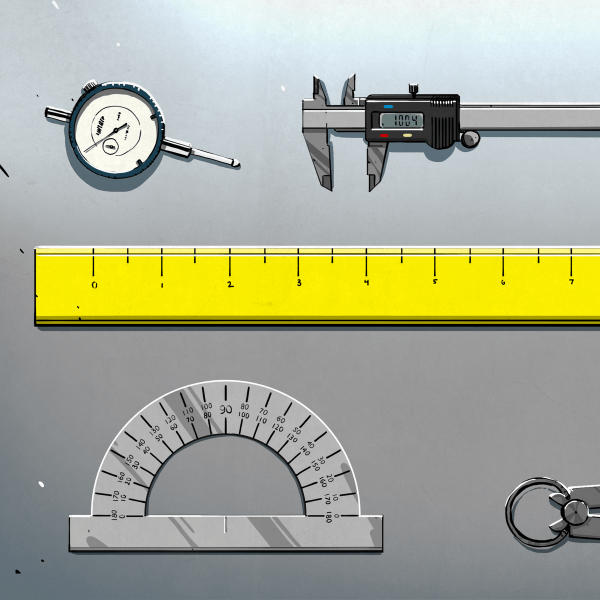





Well put!
“If I could name one thing which has been the most transformative for our community over the last couple of decades, it would have to be the proliferation of hackerspaces.”
Really? I’d go for dirt cheap PCBs, cheap and powerful microcontrollers, more widely available and affordable tooling for producing one off parts (e.g. 3D printers). I’ve never been to a hackerspace but the above have made a dramatic difference to what I can achieve.
I’d take the argument in the other direction. My broadly, the ability for communities of hobbyists to meet and share resources (information, tools, etc) has improved fantastically. Thanks to the Internet and thanks to Hackerspaces.
We were making decent single-sided PCBs relatively cheaply back in the 90’s. And a lot of prototype and on-off projects were quick to do on stripboard or veroboard, especially when compared to the time you’d have to put in front of CAD and the delivery time from PCBway and the like.
Cheap PCBs solve the problem of making 3 or more boards. Because after putting something together twice, it becomes a chore and you immediately regret all the promises you made to friends that’d you’d sell them your invented hobby-specific widget. Be it a homebrew PLC for model trains or a modular synthesizer. This stuff was a pain to put together more than once or twice back in the old days.
Same argument for 3D printers. My friends always ask me why I don’t use one for projects when I have one (well I used to. I let it get obsolete and never replaced it). It’s because I can draw on a piece of wood with a pencil with less effort than I can CAD. And if I’m just making one, then sawing it out doesn’t seem quite so arduous.
Mass production is just not for me, so these tools for doing manufacturing automation is more of a novelty to me than something strictly necessary.
“If I could name one thing which has been the most transformative for our community over the last couple of decades, it would have to be the proliferation of hackerspaces.”… really? I disagree, while human interaction is indeed part of the equation, some technologies are far more important to the community than hackerspaces. Arduino for one is in my opinion THE ecossystem that changed everything. Just to name one
BASIC Stamp was the 1990’s version of the Arduino. We’d always get excited to see articles in Nuts & Volt or Circuit Cellar that featured the BASIC Stamp.
Being able to plug something programmable and relatively affordable into a breadboard as a game change. Even in the old days we couldn’t afford even a simple ladder-logic PLC. And getting a development environment set up for an 8051 was beyond many hobbyists. And later the PIC and Scenix chips that were more difficult to program than a Stamp but a little more entry-level friendly than an 8051.
Hands down Arduino is more powerful, cheaper, and easier than the Stamp. But to me it fills the same niche. This has been more of an evolution than a revolution.
Lego Technic and Mindstorms.
https://en.wikipedia.org/wiki/Lego_Technic
We had Lego Technic Control at my school. We had a lot of TC I and some TC II sets. After school some of my friends made a “factory” that could sort bricks by color.
I got my first BASIC Stamp in 1992 and it literally changed my life and career. I used Stamps in a bunch of my early movie projects doing FX for movies like Speed and Money Train. By the time I did Star Trek: First Contact and The Fifth Element I was programming PICs directly in either assembly or Microengineering Labs PICBASIC. I was late to discover Arduinos; I’d never used them until 2014 when I was hired to program some for Grant McCune Designs (Grant got an Oscar for the original Star Wars models). Moving to Arduino was an evolution for me, but the BASIC Stamp was revolutionary, the Rosetta Stone that jump started my film career.
you’re not really part of the community when you sit there alone at home working on Arduino projects and read on stack overflow why it might not work. Hackspaces also teach soldering to kids and bring them into the world of arduinos as well. You learn things or get interested in stuff that you might not have considered before and are able to use things that you don’t have to buy. So yes, they are most transformative for the community.
When I was at school in the 1970s (UK), boys did woodwork and metalwork, girls did cooking and sewing. It’s walking a tightrope not reinforcing those attitudes whilst simultaneously acknowledging that women would be more comfortable if knitting and sewing facilities are available. (Despite my “education”, personally I enjoy doing the lot!)
I learned sewing thanks to having a textiles area at the hackspace, can recommend. many pants have been fixed!
To those who argue that specific technologies have had a greater impact than the social technology of hackerspaces, I would point out that for the amount of money one would spend on memberships in three years, it’s relatively straightforward to acquire all the major technologies that a hackerspace provides access to. In terms of tech, we’re in a post-hackerspace era for a good chunk of the world.
The social aspect of interacting with one’s peers – of _having_ peers to interact with – cannot be understated. People with whom you can share projects in their early state and get feedback, people you can bounce ideas off of and collaborate with – that’s what people are funding.
I pay DKK 1800 (USD 260) per year to have 24/7 access to a large laser cutter, lathe, mill, CNC, MIG welder, sandblasting cabin, reflow oven, band saw, and lots of other stuff. True, I have a ‘scope, soldering iron, 3D printer etc. at home too, but even adding up my ten years of membership there is still a clear economical advantage.
That seems like a remarkable bargain, I have looked a little at the handful of hackerspaces in my city, and the cheapest is on a sliding scale that starts at twice that much, and goes up to four times as much (plus hourly charges to use the equipment).
Jacksonville FL has 4 Navy bases with an emphasis on repairs of military aircraft and tech equipment. We have many high tech companies here. We have a new space port. Why can’t we establish and maintain a hacker space? Many have come and gone with high membership prices, very little equipment, and they continue to go tits-up quickly with long gaps in between.
Sigh.
I lost money investing in a hackerspace. Most of them get focused on purchasing expensive cutting edge tools. We had plasma cutters and water jet and a whole lot of stuff that 95% of the member never used, but there was a 5% of it that used the equipment all the time and ran through consumables and required maintenance from all of the use those machines received. Combined with the very costly lease in my area really killed this space.
I’d rather go low-tech and small scale. A space with various rooms, storage cabinets, and work tables. No need for a cutting edge machine shop, people interested in lathes can buy their own, people who need a water jet can start a business or order parts from another business.
Sometimes we just need a space to do projects. Around other people who are also doing projects. Add access to common hand tools and other fairly inexpensive expenditures where the majority of the members are likely to use. And that seems like a better recipe for success than the two I’ve been involved in.
Makerspace on wheels.
https://youtu.be/eSHNENbfhZ0
“Van down by the river”
B^)
I’m glad you posted that comment.
It rings so true of human nature.
Small places (even grouped together) with moderate tools, but human interaction has held villages together for thousands of years.
Hackerspaces?
Are you decades old?
The internet’s ability to spread datasheets and not databooks from corporate library, example circuits, cheap SPICE software and community message boards are BY FAR the most positive developments.
allaboutcircuits would have been nice to have in 1993.
tools and processes getting cheaper to reduce the barriers to entry for small businesses also is huge. What did 3D printing cost in the 90s? What about blank PCBs?
We take a lot for granted now, it truly is a wonderful time to work in electronics.
A friggin 68000 ROMulator was $10K. There essentially were no free compilers. EDA tools with rule checking were a fortune, even PCs were very expensive. Solder rework station cost? Oscilloscope cost?
Hackerspaces are not just about electronics. I use my space for woodworking, machining, welding, etc. as well.
but who tells you to read those fine manuals
Shout-out to Site3 – the hackerspace my friend is a member of. My friend convinced me to come with him to their weekly open evenings. And it’s been over a year and a half now that I’ve been attending those.
(most places have “open” days, so if cost is an issue, these are a great no-cost opportunity to check out the space, and to get access to tools and assistance)
I have a basement mostly full of tools and gear – just about all of it was valuable when we were renovating – but now… do I really need to still own something I’d use maybe twice a year? The hackerspace has newer and better models of that stuff that I could use whenever I need to. I figure that I have too much going on to seriously get into 3-D printing myself… but if I ever need something printed, the hackerspace has several good 3-D printers of different types, and several people who would help me get that done. I wanted to try welding… and they had a one-evening course that gave me more good instruction than if I’d gone it alone with Youtube. My friend and i helped another member resurrect a solid CNC-machine and it’s now in use a few times a week.
Hacking is special. Hacking collaboratively, in a well-equipped space, is even more special.
The labs on campus as an undergrad often had this feel. Groups using, in this case university supplied equipment, stuff we could never afford. Collaborative work environment, it was awesome.
“…libraries who have invested in a 3D printer and imagine themselves to be a hackerspace…”
Am I reading too much into this, or is this a weirdly dismissive and gatekeepy comment relative to the rest of the article?
My local library has a makerspace with a couple laser cutters, a couple Ultimakers, a selection of sizes and styles of sewing machines, a CNC router, and a vinyl cutter, along with a basic electronics workbench. Every time I’m in there, every single machine has someone using it. A local business sponsored all the machines in exchange for putting their name over the door, so there’s no cost or membership fee to use it, which means all kinds of people can come in and try their hand at making things with expensive equipment without committing to the $65+/mo that the only other local space charges.
If that’s not a makerspace, I don’t know what is.
+2 (up-votes)
“…{A}Am I reading too much into this, or {B} is this a weirdly dismissive and gatekeepy comment…?”
{A} No, you are not. You read precisely what was written, and intended.
{B} Yes, it is.
Great article, I will be posting it on the Norwich Hackspace slack
A ‘hackerspace’ is as much a state of mind as it is a piece of geography.
One point which seems to run throughout the author’s article is easily overlooked by those who are (superficially) enamored of hardware and tools: hackerspaces are not so much about the hard resources–machines; tools; software–which might be available (until new ones come along–as they always will–which are faster, bigger, ‘glitzier’…) as they are about providing companionship, acceptance, and friendship. These qualities are far more important to one’s productivity–and especially to solving problems–than almost anything else one can imagine.
“…In a good hackerspace you’ll have found your place, and you can be much more than you would have been alone…”–the author.
I participate in a hacker space dedicated to software, opensource and programming.
Yes, it has probably worse equipment than what I have at home. But it still is great hanging out with likesided people. Getting to talk and interact with each other.